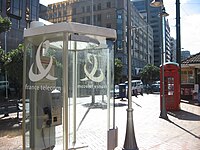
Photo from wikipedia
Abstract This paper builds a theory of deregulation and roll-out of on-road competition in the public transport sector. Focusing on the dimensions of competition, ownership and authorisation, we identify five… Click to show full abstract
Abstract This paper builds a theory of deregulation and roll-out of on-road competition in the public transport sector. Focusing on the dimensions of competition, ownership and authorisation, we identify five distinct regulatory regimes: public monopoly, regulated monopoly, unregulated monopoly, outsourcing to private monopoly and competition in the market. Our generalised theoretical framework allows for the direct comparison in the social welfare terms of the monopolies' outcomes and the fragmented market structure after deregulation. We formulate a set of parameter restrictions that make competition in the market preferable to public monopoly and competition for the market in the form of outsourcing. We also show the theoretical possibility of a ‘revised’ regulatory cycle forming a sequential transition between these identified regulatory regimes. Our model predicts possible policy reversals and the bypassing of certain phases of the cycle, that can occur due to technological advances, changes in fiscal constraints and institutional capacity improvements.
Journal Title: Research in Transportation Economics
Year Published: 2020
Link to full text (if available)
Share on Social Media: Sign Up to like & get
recommendations!